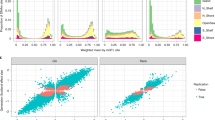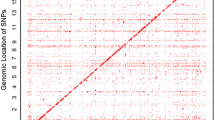Abstract
Phenotypic characteristics are known to vary substantially among different ethnicities around the globe. These variations are mediated by number of stochastic events and cannot be attributed to genetic architecture alone. DNA methylation is a well-established mechanism that sculpts our epigenome influencing phenotypic variation including disease manifestation. Since DNA methylation is an important determinant for health issues of a population, it demands a thorough investigation of the natural differences in genome wide DNA methylation patterns across different ethnic groups. This study is based on comparative analyses of methylome from five different ethnicities with major focus on Indian subjects. The current study uses hierarchical clustering approaches, principal component analysis and locus specific differential methylation analysis on Illumina 450K methylation data to compare methylome of different ethnic subjects. Our data indicates that the variations in DNA methylation patterns of Indians are less among themselves compared to other global population. It empirically correlated with dietary, cultural and demographical divergences across different ethnic groups. Our work further suggests that Indians included in this study, despite their genetic similarity with the Caucasian population, are in close proximity with Japanese in terms of their methylation signatures.



Similar content being viewed by others
References
Aryee MJ, Jaffe AE, Corrada-Bravo H et al (2014) Minfi: a flexible and comprehensive bioconductor package for the analysis of Infinium DNA methylation microarrays. Bioinformatics 30:1363–1369. doi:10.1093/bioinformatics/btu049
Basu A, Sarkar-Roy N, Majumder PP (2016) Genomic reconstruction of the history of extant populations of India reveals five distinct ancestral components and a complex structure. Proc Natl Acad Sci USA 113:1594–1599. doi:10.1073/pnas.1513197113
Billingsley G, Bin J, Fieggen KJ et al (2010) Mutations in chaperonin-like BBS genes are a major contributor to disease development in a multiethnic Bardet–Biedl syndrome patient population. J Med Genet 47:453–463. doi:10.1136/jmg.2009.073205
Chauhan G, Spurgeon CJ, Tabassum R et al (2010) Impact of common variants of PPARG, KCNJ11, TCF7L2, SLC30A8, HHEX, CDKN2A, IGF2BP2, and CDKAL1 on the risk of type 2 diabetes in 5164 Indians. Diabetes 59:2068–2074. doi:10.2337/db09-1386.G.C
Chen YA, Lemire M, Choufani S et al (2013) Discovery of cross-reactive probes and polymorphic CpGs in the Illumina Infinium HumanMethylation450 microarray. Epigenetics 8:203–209. doi:10.4161/epi.23470
Chograni M, Alkuraya FS, Maazou F et al (2015) Rgs6: a novel gene associated with congenital cataract, mental retardation, and microcephaly in a tunisian family. Investig Ophthalmol Vis Sci 56:1261–1266. doi:10.1167/iovs.14-15198
de Araujo ES, Pramio DT, Kashiwabara AY et al (2015) DNA methylation levels of melanoma risk genes are associated with clinical characteristics of melanoma patients. Biomed Res Int 2015:376423. doi:10.1155/2015/376423
Dogan MV, Shields B, Cutrona C et al (2014) The effect of smoking on DNA methylation of peripheral blood mononuclear cells from African American women. BMC Genom 15:151. doi:10.1186/1471-2164-15-151
Fortin J-P, Labbe A, Lemire M et al (2014) Functional normalization of 450K methylation array data improves replication in large cancer studies. Genome Biol 15:503. doi:10.1186/s13059-014-0503-2
Giri AK, Khan NM, Grover S et al (2014) Genetic epidemiology of pharmacogenetic variations in CYP2C9, CYP4F2 and VKORC1 genes associated with warfarin dosage in the Indian population. Pharmacogenomics 15:1337–1354
Heimerl S, Bosserhoff AK, Langmann T et al (2007) Mapping ATP-binding cassette transporter gene expression profiles in melanocytes and melanoma cells. Melanoma Res 17:265–273. doi:10.1097/CMR.0b013e3282a7e0b9
Heyn H, Moran S, Hernando-Herraez I et al (2013) DNA methylation contributes to natural human variation. Genome Res 23:1363–1372. doi:10.1101/gr.154187.112
Horsley V, Aliprantis AO, Polak L et al (2008) NFATc1 balances quiescence and proliferation of skin stem cells. Cell 132:299–310. doi:10.1016/j.cell.2007.11.047
Huang DW, Sherman BT, Lempicki RA (2008) Systematic and integrative analysis of large gene lists using DAVID bioinformatics resources. Nat Protoc 4:44–57. doi:10.1038/nprot.2008.211
INdian DIabetes COnsortium (2011) INDICO: the development of a resource for epigenomic study of Indians undergoing socioeconomic transition. Hugo J 5:65–69. doi:10.1007/s11568-011-9157-2
Lam LL, Emberly E, Fraser HB et al (2012) Factors underlying variable DNA methylation in a human community cohort. Proc Natl Acad Sci USA 109 Suppl:17253–17260. doi:10.1073/pnas.1121249109
Luo Z, Zeng W, Tang W et al (2014) CD147 interacts with NDUFS6 in regulating mitochondrial complex I activity and the mitochondrial apoptotic pathway in human malignant melanoma cells. Curr Mol Med 14:1252–1264
Norgett EE, Yii A, Blake-Palmer KG et al (2015) A role for VAX2 in correct retinal function revealed by a novel genomic deletion at 2p13.3 causing distal Renal Tubular Acidosis: case report. BMC Med Genet:16–20. doi:10.1186/s12881-015-0182-1
Oakes CC, Seifert M, Assenov Y et al (2016) DNA methylation dynamics during B cell maturation underlie a continuum of disease phenotypes in chronic lymphocytic leukemia. Nat Genet 48:253–264. doi:10.1038/ng.3488
Pena J a, Losi-Sasaki JL, Gooch JL (2010) Loss of calcineurin Aalpha alters keratinocyte survival and differentiation. J Invest Dermatol 130:135–140. doi:10.1038/jid.2009.222
Robertson KD (2005) DNA methylation and human disease. Nat Rev Genet 6:597–610. doi:10.1038/nrg1655
Suzuki R, Shimodaira H (2006) Pvclust: an R package for assessing the uncertainty in hierarchical clustering. Bioinformatics 22:1540–1542. doi:10.1093/bioinformatics/btl117
Tabassum R, Mahajan A, Dwivedi OP et al (2012) Common variants of SLAMF1 and ITLN1 on 1q21 are associated with type 2 diabetes in Indian population. J Hum Genet 57:184–190. doi:10.1038/jhg.2011.150
Tabassum R, Chauhan G, Dwivedi OP et al (2013) Genome-wide association study for type 2 diabetes in indians identifies a new susceptibility locus at 2q21. Diabetes 62:977–986. doi:10.2337/db12-0406
Takenaka S, Itoh T, Fujiwara R (2013) Expression pattern of human ATP-binding cassette transporters in skin. Pharmacol Res Perspect 1. doi:10.1002/prp2.5
Xu Z, Niu L, Li L, Taylor JA (2015) ENmix: a novel background correction method for Illumina HumanMethylation450 BeadChip. Nucleic Acids Res 44:1–6. doi:10.1093/nar/gkv907
Yoo H, Kang JW, Lee DW et al (2015) Pyruvate metabolism: a therapeutic opportunity in radiation-induced skin injury. Biochem Biophys Res Commun 460:504–510. doi:10.1016/j.bbrc.2015.03.060
Acknowledgements
We thank all the participating subjects and acknowledge the support and participation of members of the INdian DIabetes COnsortium (INDICO) for the generation of data. This work was supported by the Council of Scientific and Industrial Research [CSIR], Government of India through Centre for Cardiovascular and Metabolic Disease Research [CARDIOMED] project [Grant No.: BSC0122-(9)]. We thank Dr. Sandip K. Basu and Dr. Abhay Sharma for critically evaluating the manuscript and thanks to Mr. Praveen Gupta, Premas Biotech Pvt Ltd, Gurgaon, India for gifting some specific reagents for this study when it was required most.
Author information
Authors and Affiliations
Corresponding authors
Ethics declarations
Conflict of interest
The authors declare that they have no conflict of interest.
Ethical approval
All procedures performed in studies involving human participants were in accordance with the ethical standards of the Human Ethics Committee of CSIR-Institute of Genomics and Integrative Biology and Institute Ethics Committee of All India Institute of Medical Sciences, New Delhi and carried out in accordance with the principles of the 1964 Helsinki declarations and its later amendments or comparable ethical standards.
Informed consent
Informed written consent was obtained from all individual participants included in the study.
Additional information
Communicated by S. Hohmann.
A. K. Giri and S. Bharadwaj equally contributed.
Electronic supplementary material
Below is the link to the electronic supplementary material.
Rights and permissions
About this article
Cite this article
Giri, A.K., Bharadwaj, S., Banerjee, P. et al. DNA methylation profiling reveals the presence of population-specific signatures correlating with phenotypic characteristics. Mol Genet Genomics 292, 655–662 (2017). https://doi.org/10.1007/s00438-017-1298-0
Received:
Accepted:
Published:
Issue Date:
DOI: https://doi.org/10.1007/s00438-017-1298-0




